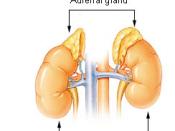General Adaptation Syndrome What is General Adaptation Syndrome (GAS), what can cause it, and what can it do to the body? GAS is a series of physiological and psychological reactions that occur from prolonged stress. GAS has been divided into three phases: an alarm reaction, a stage of resistance, and a stage of exhaustion, by a Canadian physiologist by the name of Hans Selye. Selye first noticed the syndrome by realizing that the first symptoms of almost all illness or trauma are almost identical in nature. After researching the symptoms of stress more in depth Selye categorized them into three phases of GAS.
The first phase is known as the alarm reaction, also commonly known as the fight or flight stage. The body in this phase chooses how to deal with the stress at hand. Generally at first the heart rate, blood pressure and breathing rise in order to supply the muscles and brain with more oxygen.
This coupled with the hypothalamus part of the brain controlling the autonomic nervous system increases the adrenocorticotropic hormones (ACTH) produced by the pituitary glands flow causing the body to become more efficient and ready for any trouble to arise. The ACTH stimulates the adrenal glands to let out adrenaline. The amount that the pituitary gland lets out depends upon what the brain feels the danger level is. Blood flow to the stomach, skin, liver and other organs that are not as important to the state of the emergency are decreased. The body also produces natural fats and sugars to supply the parts of the body that are affected. This stage also has a direct effect on the immune system, eating up white blood cells that are not usually used so quickly. If this only happens occasionally it is not that damaging, to...


